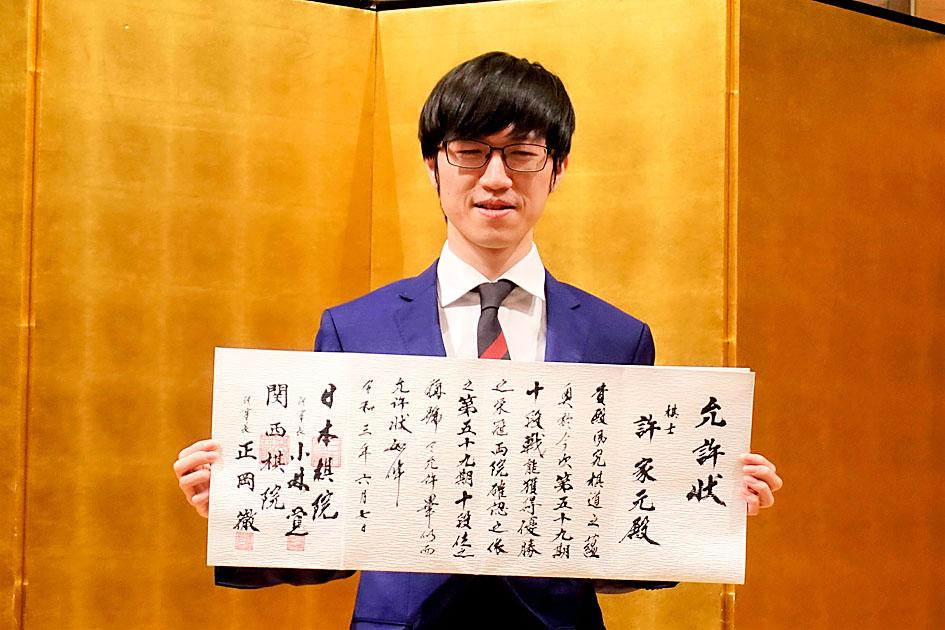Professional go player Hsu Chia-yuan (許家元) was on Monday conferred the title of ninth dan — the highest professional ranking — at a ceremony in Tokyo.
Hsu, 23, received the title for winning the 59th Judan competition held in April. The competition, which is sponsored by Sankei Shimbun, has been held annually since 1962.
Representative to Japan Frank Hsieh (謝長廷) attended the ceremony, and used the opportunity to thank Japan for donating 1.24 million doses of the AstraZeneca COVID-19 vaccine to Taiwan.

Photo: Lin Tsuei-yi, Taipei Times
Hsieh said Hsu’s win also demonstrated how the game of go could bring Taiwanese and Japanese even closer together.
At the Gosei competition held in 2018, Hsu beat Japanese Yuta Iyama to claim the title of Gosei.
Hsu had been given the rank of eighth dan after his Gosei win, but was upgraded to ninth dan on Monday for holding two of the seven professional go titles in Japan.
Hsu, who began his professional go career in 2013, became the third-fastest player in Japan to reach the rank of ninth dan, behind Shibano Toramaru and Yuta Iyama.
Hsu challenged Toramaru in the Judan competition, winning three out of five matches to claim the title.
Japan Go Association chairman Satoru Kobayashi praised Hsu for his “interesting go play style,” and said that Hsu and Toramaru are the “two most interesting people in the world of Japanese go.”
“Hsu’s style is modest. If he feels the game isn’t going well, he cedes defeat — he doesn’t sloppily drag it on,” Kobayashi said.
Hsu, Toramaru, 21, and Ryo Ichiriki, 23, have received attention among Japanese go players and fans due to their talent and young age, he said.
Hsu said go players’ skills have largely converged since the emergence of go-playing artificial-
intelligence software.
Mental drive is now as important as skill, he said, adding that winning was a great honor and a big confidence boost.
Hsu echoed Hsieh’s thanks to Japan for its vaccine donation, saying he was “deeply moved.”
To celebrate Hsu’s win, Sankei Shimbun began selling Taiwanese pineapples on its Web site on Sunday, the company said, adding that it sold 100 in just three hours.

The first global hotel Keys Selection by the Michelin Guide includes four hotels in Taiwan, Michelin announced yesterday. All four received the “Michelin One Key,” indicating guests are to experience a “very special stay” at any of the locations as the establishments are “a true gem with personality. Service always goes the extra mile, and the hotel provides much more than others in its price range.” Of the four hotels, three are located in Taipei and one in Taichung. In Taipei, the One Key accolades were awarded to the Capella Taipei, Kimpton Da An Taipei and Mandarin Oriental Taipei. Capella Taipei was described by

The Taichung District Court yesterday confirmed its final ruling that the marriage between teenage heir Lai (賴) and a man surnamed Hsia (夏) was legally invalid, preventing Hsia from inheriting Lai’s NT$500 million (US$16.37 million) estate. The court confirmed that Hsia chose not to appeal the civil judgement after the court handed down its ruling in June, making the decision final. In the June ruling, the court said that Lai, 18, and Hsia, 26, showed “no mutual admiration before the marriage” and that their interactions were “distant and unfamiliar.” The judge concluded that the couple lacked the “true intention of

EVA Airways today confirmed the death of a flight attendant on Saturday upon their return to Taiwan and said an internal investigation has been launched, as criticism mounted over a social media post accusing the airline of failing to offer sufficient employee protections. According to the post, the flight attendant complained of feeling sick on board a flight, but was unable to take sick leave or access medical care. The crew member allegedly did not receive assistance from the chief purser, who failed to heed their requests for medical attention or call an ambulance once the flight landed, the post said. As sick

INDUSTRY: Beijing’s latest export measures go beyond targeting the US and would likely affect any country that uses Chinese rare earths or related tech, an academic said Taiwanese industries could face significant disruption from China’s newly tightened export controls on rare earth elements, as much of Taiwan’s supply indirectly depends on Chinese materials processed in Japan, a local expert said yesterday. Kristy Hsu (徐遵慈), director of the Taiwan ASEAN Studies Center at the Chung-Hua Institution for Economic Research, said that China’s latest export measures go far beyond targeting the US and would likely affect any country that uses Chinese rare earths or related technologies. With Japan and Southeast Asian countries among those expected to be hit, Taiwan could feel the impact through its reliance on Japanese-made semi-finished products and